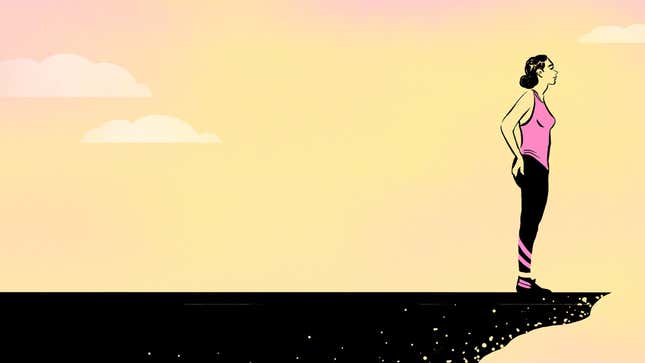The Kind of Woman Who Got Out of the Car
In Depth

“I wouldn’t go unarmed,” warns the city manager of Colfax, California. He is at least five inches shorter than the men who flank him, but just as thick and white. He is the friendly one, if friendly can be defined as engaging in a conversation.
I smile because he’s obviously joking, and I take the way he raises his eyebrows after each sentence and tips his chin forward, creating a ripple underneath, as confirmation. I’m a youngish, active woman traveling alone, which means a lot of things, including hardly ever getting a straight answer from a man. If it comes, it’s often followed by a warning: be careful. They see danger around me. I sometimes wonder if that’s because, in some other setting, they’d present it.
By now, this has happened to me in a dozen City Halls off Historic Highway 49, but this small, modern beige building in the historic part of town, was the first one to share a room with the Sheriff’s Department and the entirely male, entirely Republican, city council. This town, with a population of 1,963, strikes me as just a bit more Wild West than most, but not in the tourist way. I haven’t seen a single person. I hardly saw anyone in Colfax.
It dawns on me: he isn’t joking.
I ask the men, addressing no one in particular, if they are serious about the need for guns. As they nod in unison, I see the towering, thick undersheriff reach down toward his belt, in a practiced sort of way, his forefinger tapping his gun holster as if it were a talisman.
Disbelieving, I emphasize that I am headed for a California State Park, and the inquiry that brought me in had nothing to do with gun control, or, as they would probably say, gun rights. I just want to know which river among the three that snakes through town has most suffered from the drought. It was there, among the American, Bear or Yuba Rivers, that I was likely to find the most dedicated, and presumably, most desperate panners, those who braved off-season conditions in hopes that the receded water line would make it easier to find gold.
In truth, I knew I’d find more than panners. The mountains of Colfax have been infamous since the ‘49ers, starting with the Gold Country’s first stagecoach robbery. The sheriff had responded by swearing in a misfit posse and lighting out for the mountains, where the short-lived Reelfoot Williams Gang, comprised of scrappy youths, were hiding. Only Reelfoot and Rattlesnake Dick, who took refuge in a deep cave, had escaped.
The region continued to be hospitable to desperadoes and outcasts, the paranoid and the infirm.
The Weimer Joint Sanatorium for tuberculosis, a hospital that operated from 1919 to 1972, had made a makeshift cemetery for deceased patients of no means or family on what is now state land. Deteriorating grave markers are covered in thick brush. It is damp and dark from the trees above, and fog dances across the ground, which covers poor, abandoned souls. Even a skeptic like me is uneasy, but for this area, that’s some tired lore. What are apparitions when local hunters like Justin Smeja claim to have killed a Bigfoot in 2013? The only evidence he’s released is a picture of the steak he made from it, but he swears he’s in possession of a DNA test he solicited from an unnamed lab for his forthcoming, self-published “tell-all” book. Locals who live along the Yuba River have long implored UFO hunters to investigate what they claim to be a constant barrage of inexplicable flashes of light in the sky and animals dead from shock. One woman swears aliens chased away all her laying hens. This region is, in short, an anything-goes zone, inhabited either by strange creatures or by creatures almost as strange and menacing: people who fiercely believe in strange creatures.
-

-

-

-

-

-

-

-

-

-

-

-

-

-

-

-

-

-

-

-

-

-

-

-

-

-

-

-

-

-

-

-

-

-

-

-

-

-

-

-








































